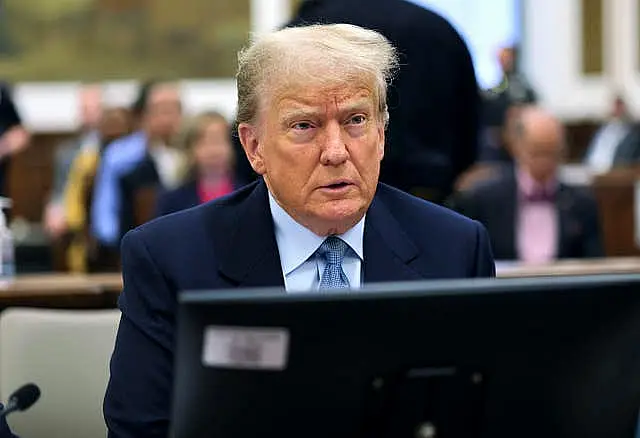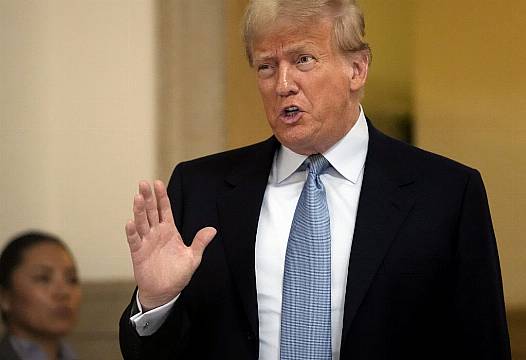A woman has been arrested after she stood up at former president Donald Trump’s civil fraud trial in New York and walked towards the front of the court where he was sitting.
The woman, later identified as a court employee, retreated after a court officer told her to return to her seat.
A short time later, officers escorted the woman out of the Manhattan courtroom and arrested her.
She was charged with contempt of court for disrupting a court proceeding, state court spokesperson Lucian Chalfen said.
Mr Chalfen said the woman had been yelling out to Mr Trump that she wanted to help, though reporters in the courtroom did not hear her raise her voice. She was later heard screaming in the courthouse lobby as officers removed her from the building.

“None of the parties were ever in any danger,” Mr Chalfen said.
The woman, who was not named, works in a different state courthouse. She has been placed on administrative leave and barred from entering state court facilities pending an investigation, Mr Chalfen said.
The trial went on, albeit with one other disruption — this one after Mr Trump threw up his hands in frustration and grumbled to his lawyers while a witness was testifying against him.
Judge Arthur Engoron warned Mr Trump and others involved in the case to keep their voices down after the 2024 Republican frontrunner conferred animatedly with his lawyers at the defence table during real estate appraiser Doug Larson’s second day of testimony.
State lawyer Kevin Wallace asked Judge Engoron to ask the defence to “stop commenting during the witness’ testimony”, adding that the “exhortations” were audible on the witness’ side of the room.
The judge then asked everyone to keep their voices down, “particularly if it’s meant to influence the testimony”.
Mr Trump was in court for a second straight day on Wednesday, diverting from Iowa, New Hampshire and other campaign haunts to give close attention to the case threatening to upend his real estate empire and his wealthy businessman image.

Mr Trump attended the first three days, but skipped last week. On Tuesday, he left early to give a deposition in an unrelated lawsuit.
In a pr-etrial decision last month, Judge Engoron ruled that Mr Trump and his company, the Trump Organisation, committed years of fraud by exaggerating his asset values and net worth on annual financial statements used to make deals and get better terms on loans and insurance.
As punishment, the judge ordered that a court-appointed receiver take control of some Trump companies, putting the future oversight of Trump Tower and other marquee properties in question, but an appeals court has blocked that for now.
Inside the courtroom, which is closed to cameras, Mr Trump grew irritated as Mr Larson testified. Mr Trump’s lawyers were seeking to undercut the state’s claims that his top corporate deputies played games to inflate the values of his properties and pad his bottom line.
In a series of questions, Trump lawyer Lazaro Fields sought to establish that Larson had, at one point, undershot the projected 2015 value of a Trump-owned Wall Street office building by 114 million dollars. Mr Larson said the “values were not wrong — it’s what we knew at the time”.
Mr Trump threw up his hands during the exchange.

On Tuesday, Mr Larson said that he never consulted with or gave permission for the Trump Organisation’s former controller, Jeffrey McConney, to cite him as an outside expert in the valuation spreadsheets he used to create Mr Trump’s financial statements.
Mr Fields on Wednesday accused Mr Larson of lying, pointing to a decade-old email exchange between Mr McConney and the appraiser.
That touched off an angry back-and-forth between the defence and state sides, with Trump lawyer Christopher Kise suggesting that Mr Larson could risk perjuring himself and needed to be advised about his rights against self-incrimination. State lawyer Colleen Faherty called Mr Kise’s comments “witness intimidation”.
After Mr Larson was escorted out of the courtroom, Mr Kise insisted that he was trying to protect the witness’ rights, while state lawyer Kevin Wallace complained that the defence was mounting “a performance” for the media.
Ultimately, the judge allowed Mr Larson to return and answer the question with no legal warning. Mr Larson said he did not recall the email.
Asked again whether he understood that Mr McConney had asked for his input in order to carry out valuations, a weary Mr Larson said: “That’s what it appears.”
After Mr Larson, state lawyers called Jack Weisselberg, the son of former long-time Trump Organisation finance chief Allen Weisselberg.
The son, who arranged financing for Mr Trump while an executive at Ladder Capital, testified that those deals generally started with discussions amongst father and son.







